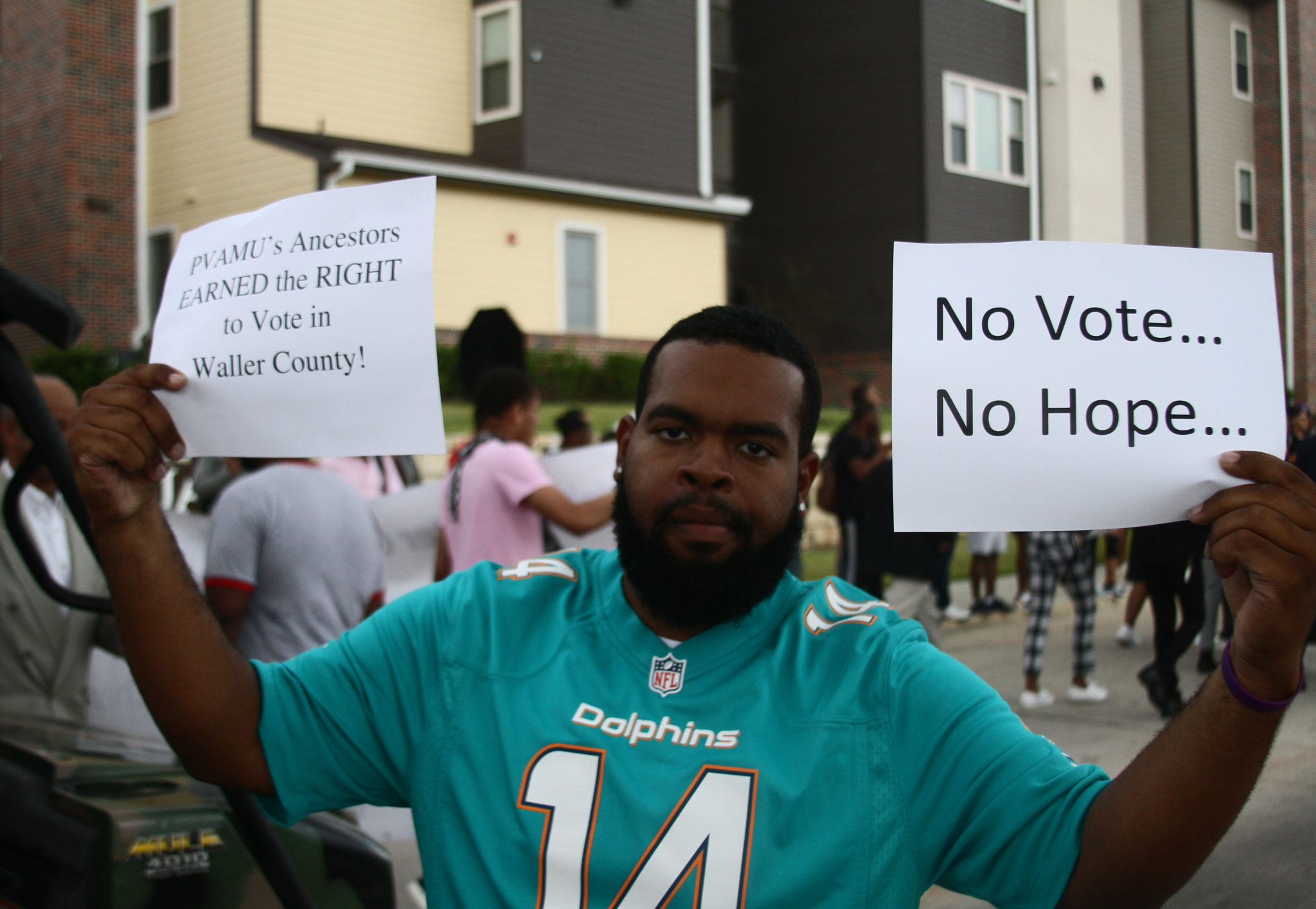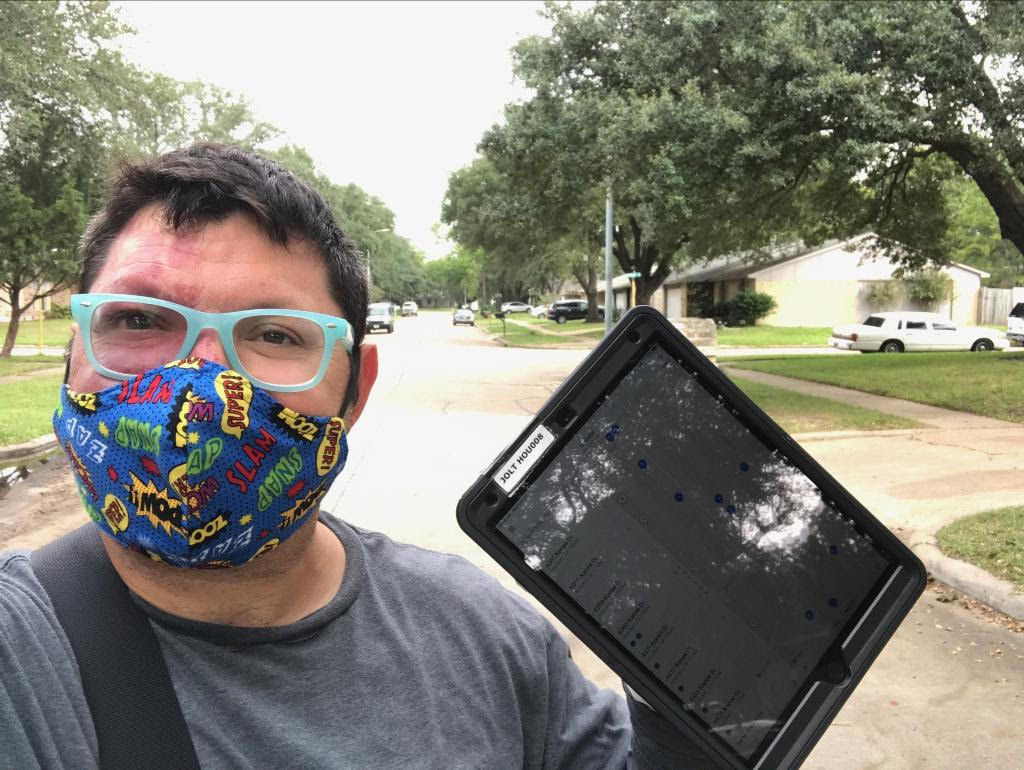A little more than a month before early voting started in Texas, a group of 20-somethings and teenagers with the Sunrise Movement drove to Congressman Michael McCaul’s home in an Austin suburb. It was 5 a.m., and the climate activists from a district that stretches from Austin all the way to Katy wanted to send their Republican representative a message: They would do everything they could to replace him with Mike Siegel, a Democrat who has promised to back the Green New Deal and who came within 5 points of winning the district in 2018.
In the weeks that followed, Sunrise activists from across the country—alongside the Texas Democratic party and former presidential candidate Julian Castro—made hundreds of thousands of calls for Mike Siegel and Julie Oliver, another Green New Deal candidate running in an Austin district.
Some of the volunteers who helped Sunrise call hundreds of thousands of voters in just a few days aren’t old enough to vote themselves, says Rachele Merliss, a 23-year-old organizer with the Austin chapter. “[Young people] feel the urgency of the climate crisis in the way that older people don’t,” she says. That urgency makes them some of the most effective phone bankers for Green New Deal candidates. It’s also led to at least one viral TikTok featuring progressive Texas candidates, as the group of young activists works to turn out young voters in Texas. “A lot of politics can be dark and stressful,” Merliss says. Look no further than the raging pandemic, the ongoing protests around police brutality, or the wildfires and hurricanes that have battered the West Coast and Gulf Coast. Sunrise’s “massive army of young people,” as Merliss calls them, is one of this year’s political bright spots.
It’s not just Sunrise: Young people all over Texas are more politically engaged than ever. By the end of early voting, more than 1.3 million voters under the age of 30 had cast their ballot—surpassing the total votes cast by young people in 2016. Young voters doubled their share of the early vote total, from 6 percent in 2016 to 13 percent this year. Progressive organizers and Democratic strategists have been using every tool in the proverbial box to turn out young voters, who have historically had abysmally low turnout rates. In 2014, for example, only 8 percent of voters under 30 participated in the election; in 2018, when Beto O’Rourke tried to flip Ted Cruz’s senate seat, turnout rose to 25 percent.
Texas has one of the largest populations of young people in the nation: The median age of a Texan is 34, about three years younger than the national median. Millennial and Gen Z Texans are also more diverse than their national cohort. Nearly two-thirds are nonwhite, according to data from the State Comptroller. In previous elections, young Texans overwhelmingly favored Democrats, and their turnout this year could flip races up and down the ballot.
This political momentum “has been brewing for a long time,” says Jacob Caynon, the Gen Z and Millennial organizer for Texas Democrats. He was in high school during the 2016 election and 2018 Parkland shooting and says he remembers feeling hopeless. “I think young people in Texas are tired of what’s happening and the leadership we’re seeing.”
Texas’ voter registration laws haven’t been particularly friendly towards young voters, particularly young voters of color. For example, Texas is one of the handful of states where a student ID isn’t valid at the polls. And in 2018, students at Prairie View A&M, a historically Black college in a majority Black city, sued their county officials after the campus was denied an early voting site; during the March primaries, voters at Texas Southern, another HBCU in Houston, waited in line for hours and the final vote was cast after 1 a.m. Large college campuses like University of Texas at Austin have been gerrymandered so that the student voting bloc is split into two congressional districts—the 25th district, where Oliver is running to unseat Roger Williams, who’s been in office since 2013, and the 21st, where Democrat Wendy Davis is in a competitive race against Republican Chip Roy.

The list continues: Texas is one of 11 states that doesn’t have an online voter registration system. Voters have to print out and mail in a form to register—a subtle hurdle for younger voters, says Kia Kolderup-Lane, the head of public policy and strategic initiatives at Big Tent Creative, a digital organizing firm.
“Many people in Gen Z have never mailed a package before, or [had to] buy stamps,” she says. “Many don’t have access to printers in their homes, or they are using their phones for everything,” she says. The firm partnered with influencers like San Antonio-based Paradiisedd to direct viewers to Bigtent’s voter registration website, where they could request a pre-filled registration form, complete with a stamp and an envelope.
Nationwide, Bigtent’s campaign registered 25,000 voters, the majority of whom were under 25; a fifth were in Texas. After voter registration closed, TikTokers continued to emphasize the importance of showing up at the polls, showing off their “I Voted” stickers or the outfits they wore to the polls, in an attempt to cultivate a healthy dose of FOMO among their peers.
While digital organizing on TikTok is a novel idea, it isn’t replacing traditional, grassroots organizing that targets young voters. In Austin, volunteers with Texas College Democrats dropped off 14,000 voter registration forms across West Campus once students arrived back on campus, says the chapter president, Joe Cascino. Across the state, organizers have been on the ground for months registering voters, block-walking, and text or phone banking. “We have been preparing for this for the past four years,” says Antonio Arellano, the interim director of Jolt, a progressive Latinx political advocacy group. “Before 2016, there was a massive void in Texas politics when it came to harnessing the power of young Latino voters.” According to a report from the organization, 46 percent of Latinos in Texas are voting-age citizens—but only 15 percent of the state’s Latino population voted in the 2016 presidential election.

This election cycle, Jolt invested hundreds of thousands of dollars in mobilizing voters in the Houston, Dallas, and San Antonio areas through social media, text and phone banks, and door-to-door canvassing. Jolt’s goal is to reach 75,000 homes in majority-Latino neighborhoods before election day. “We hear folks say, ‘You’re the first organization to knock on my door,’ or ‘No one block walks in this part of town,’” Arellano says. In 2016, Texas’ Latino voters of all ages favored Hillary Clinton over Donald Trump by 27 points. After four years of the Trump administration, Arellano says there’s a lot more on the line this year, pointing to specific policy issues that young people are engaged on: ending family separation at the border, for example, or increasing access to health insurance so that Latinos are not disproportionately uninsured in Texas.
But even if Joe Biden wins the Oval Office, organizers know that the fight isn’t over: They will still have to mobilize and engage new, young voters to push for proggressive policies like the Green New Deal or Medicare for All. “Gen Zers and Millennials are coming to terms with the future that they are going to inherit is one of chaos. They have to take control of it now to have a sustainable future,” Arellanos says.
“Texas is the solution,” he says. “This state can usher in an era of opportunity and prosperity with its 38 electoral votes.”
Read more from the Observer:
-
What Will A Texas-Sized Turnout Mean for Trump and Cornyn?: With record voter turnout in early voting, Texas is a presidential toss-up. John Cornyn is getting worried.
-
Why is Michael Bloomberg Giving $2.6 Million to Elect a Railroad Commissioner in Texas?: Hint: It’s not about trains. “The most important climate election in the nation” may be at stake.
-
How Texas Jails Avoid Investigations of Inmate Deaths: Every Texas jail death is supposed to be investigated. But a recent case shows how facilities skirt the law and avoid scrutiny.






